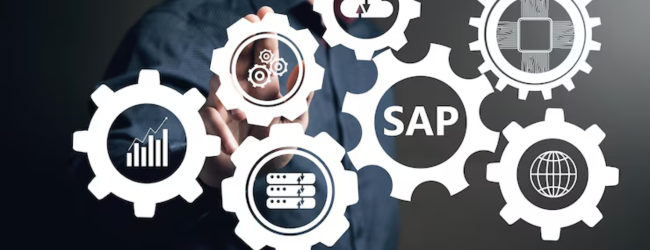Table of contents
In today’s fast-paced business environment, even small businesses need to operate efficiently and make informed decisions to thrive. Enterprise Resource Planning (ERP) systems, once considered a tool only for large corporations, are now increasingly accessible and beneficial for small businesses in India.
This article will guide you through the world of ERP for small businesses, explaining what it is, its advantages, key features, how to choose the right system, and more. We’ll keep the language simple and provide real-world examples to help you understand how ERP can transform your small business.
What is ERP for Small Business?

At its core, an ERP system is a software solution that integrates various business processes into a single, unified platform. Think of it as a central nervous system for your business, connecting different departments like:
- Finance and Accounting: Managing budgets, tracking expenses, generating financial reports, and handling invoicing.
- Sales and Marketing: Managing customer relationships (CRM), tracking sales leads, automating marketing campaigns.
- Inventory Management: Monitoring stock levels, managing orders, and optimizing warehouse operations.
- Purchasing: Streamlining the procurement process, managing vendor relationships, and tracking purchase orders.
- Human Resources (HR): Managing employee data, payroll, attendance, and recruitment.
- Manufacturing (if applicable): Planning production schedules, managingBill of Materials (BOM), and tracking work orders.
For a small business, this integration means that data flows seamlessly between departments, eliminating silos and providing a holistic view of the entire operation. This leads to better decision-making, improved efficiency, and ultimately, business growth.
Why Should a Small Business in India Consider ERP?
While it might seem like an unnecessary expense initially, implementing an ERP system can bring significant advantages to small businesses in India:
- Improved Efficiency: Automating repetitive tasks, such as generating invoices or tracking inventory, frees up valuable time for you and your employees to focus on strategic activities. For example, a small textile business in Surat could automate its order processing and reduce the time spent on manual data entry by up to 70%.
- Better Decision-Making: With all critical business data centralized, you gain real-time visibility into your performance. This allows you to identify trends, analyze profitability, and make data-driven decisions. Imagine a small restaurant in Bengaluru using ERP to track sales data and identify their most popular dishes, allowing them to optimize their menu and reduce food waste.
- Enhanced Collaboration: An ERP system breaks down departmental barriers, allowing different teams to access and share information easily. This improves communication and collaboration, leading to smoother workflows. For instance, if the sales team of a small electronics retailer in Mumbai updates a customer order, the inventory team is immediately notified to ensure stock availability.
- Cost Reduction: By streamlining processes, reducing errors, and improving inventory management, ERP can lead to significant cost savings in the long run. For example, better inventory control can minimize holding costs and prevent stockouts, which can be crucial for a small e-commerce business.
- Improved Customer Service: Access to comprehensive customer data, including past purchases and interactions, enables you to provide personalized and efficient customer service. A small travel agency in Delhi could use ERP to quickly access customer booking history and preferences, leading to higher customer satisfaction.
- Scalability: As your small business grows, an ERP system can adapt to your evolving needs, allowing you to add new users and functionalities as required. This ensures that your technology infrastructure can support your expansion plans.
- Compliance: Many ERP systems help small businesses comply with local regulations, such as GST (Goods and Services Tax) in India, by automating tax calculations and generating necessary reports.
Key Features to Look for in an ERP for Small Business

When choosing an ERP system for your small business, consider these essential features:
- Financial Management: Core accounting functionalities, including general ledger, accounts payable, accounts receivable, budgeting, and financial reporting. 1
- Customer Relationship Management (CRM): Tools for managing customer interactions, tracking leads, and nurturing relationships.
- Inventory Management: Features for tracking stock levels, managing inventory movements, and optimizing warehouse operations.
- Sales Order Management: Streamlining the sales process from quotation to order fulfillment.
- Purchasing Management: Managing the procurement process, from vendor selection to purchase order processing.
- Reporting and Analytics: Capabilities to generate insightful reports and dashboards to track key performance indicators (KPIs).
- User-Friendly Interface: An intuitive and easy-to-navigate interface is crucial for adoption by your team.
- Mobile Accessibility: The ability to access the ERP system on mobile devices can be beneficial for businesses with staff on the go.
- Integration Capabilities: The ERP system should be able to integrate with other software your business uses, such as e-commerce platforms or payment gateways.
- Scalability: Ensure the system can accommodate your future growth.
Choosing the Right ERP System: A Step-by-Step Guide
Selecting the right ERP system is a critical decision. Here’s a step-by-step approach:
- Identify Your Business Needs: Clearly define your current challenges and future goals. What specific processes do you want to improve? What are your pain points?
- Set a Budget: Determine how much you are willing to invest in an ERP system, considering both implementation costs and ongoing subscription fees.
- Research Different Vendors: Explore various ERP vendors that cater to small businesses in India. Look for industry-specific solutions if applicable.
- Request Demos: Schedule demos with shortlisted vendors to see the software in action and understand its features and functionalities.
- Consider Cloud vs. On-Premise: Cloud-based ERP systems offer flexibility and lower upfront costs, while on-premise solutions provide more control over data but require more IT infrastructure. For most small businesses in India, cloud-based solutions are often more suitable.
- Check for Customization Options: Ensure the ERP system can be customized to meet your specific business requirements.
- Evaluate Vendor Support and Training: Choose a vendor that offers reliable customer support and comprehensive training to ensure smooth implementation and adoption.
- Read Reviews and Get References: Check online reviews and ask for references from other small businesses that have implemented the system.
Real-World Examples in India
- A small garment manufacturer in Tirupur implemented an ERP system to integrate its production planning, inventory management, and sales order processing. This resulted in a 20% reduction in production lead time and improved on-time delivery.
- A family-owned grocery store chain in Kerala adopted an ERP system to manage its inventory across multiple locations, track sales data, and optimize procurement. This helped them reduce stock wastage by 15% and improve profitability.
- A growing pharmaceutical distributor in Hyderabad used an ERP system with CRM capabilities to manage its relationships with doctors and pharmacies, track sales targets, and improve customer engagement.
Need Expert Guidance?
Starting a business can be challenging, but you don’t have to do it alone! At Boss Wallah, our 2,000+ business experts are ready to provide valuable insights and guidance. Whether you need help with marketing, finance, sourcing, or any other area of any business, our business experts are here to help you succeed- https://bw1.in/1116
Confused about Which Business to Start?
Want to start your own business but unsure which one to choose? Explore Boss Wallah, where you’ll find 500+ courses by successful business owners, featuring practical, step-by-step guides on starting and growing various businesses.
Find your perfect business idea today – https://bw1.in/1111
Conclusion
Implementing an ERP system is no longer just for big businesses. For small businesses in India looking to streamline operations, improve efficiency, make better decisions, and achieve sustainable growth, ERP offers a powerful solution. By carefully assessing your needs and choosing the right system, you can unlock significant benefits and position your business for long-term success in the competitive Indian market.
Frequently Asked Questions (FAQs)
- What is the typical cost of an ERP system for a small business in India?
- The cost can vary significantly depending on the vendor, features required, number of users, and deployment model (cloud vs. on-premise). Cloud-based solutions often have lower upfront costs and subscription-based pricing, ranging from a few thousand to tens of thousands of rupees per month. On-premise solutions involve a larger upfront investment for software licenses and infrastructure.
- How long does it take to implement an ERP system?
- Implementation time can range from a few weeks to several months, depending on the complexity of your business processes and the chosen ERP system. Planning, data migration, customization, and user training are key factors that influence the timeline.
- Do I need a dedicated IT team to manage an ERP system?
- For cloud-based ERP systems, the vendor typically handles the technical infrastructure and maintenance. However, you will likely need someone within your organization to act as a system administrator and point of contact for the vendor. For on-premise solutions, a dedicated IT team or external IT support is usually necessary.
- Will an ERP system be too complex for my employees to learn?
- Modern ERP systems often have user-friendly interfaces and vendors provide training and support to ensure smooth adoption. Choosing a system with an intuitive design and investing in proper training are crucial for user acceptance.
- Can I start with a basic ERP system and add more features later?
- Yes, many ERP vendors offer modular systems that allow you to start with essential functionalities and add more modules as your business grows and your needs evolve. This provides flexibility and helps manage initial costs.
- How secure is my data in a cloud-based ERP system?
- Reputable cloud ERP vendors invest heavily in security measures, including data encryption, firewalls, and regular backups, to protect your data. It’s essential to choose a vendor with strong security certifications and practices.
- What are some popular ERP vendors for small businesses in India?
- Some popular ERP vendors catering to small businesses in India include Zoho One, TallyPrime with add-ons, SAP Business One, Oracle NetSuite (for growing businesses), and local vendors offering customized solutions.
- How can I measure the ROI (Return on Investment) of an ERP system?
- You can measure ROI by tracking key metrics before and after ERP implementation, such as reduced operational costs, improved efficiency, increased sales, better inventory turnover, and enhanced customer satisfaction.


